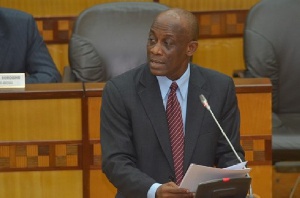An Economic policy think-tank, the Institute for Fiscal Studies (IFS), has described government’s 2015 budget statement and economic policy as being too “sketchy and short of transformational ambition”.
This year’s budget presented to Parliament last November was christened “Transformational Agenda: Securing the Bright Medium Term Prospects of the Economy”, but the policy think-tank in its review said the budget does not provide details of the transformation process’ drivers and the expected outcomes.
According to the IFS, though the budget’s theme is appropriate -- given the current economic crisis facing the country which is reflected in declining economic growth, concentration of exports in a few primary commodities, fiscal deterioration, macroeconomic instability, and increasing debt stock -- the budget responses are sketchy and short of transformational ambition.
“The budget does not explain the form that the proposed transformation will take…It does not indicate how innovation and technology-led productivity growth will be pursued, how to transform agriculture and manufacturing to diversify the economy, and how to foster inter-sectoral linkages,” the policy think-tank said.
The report, authored last December, further pointed out that not only do the details of investment in human capital and development of labor force skills remain foggy, but the role of the private sector as a key lever for enhancing the scope and scale of GDP and its growth was not properly articulated.
“As such, the budget will not be able to accelerate transformation of the economy and improve lives of the people,” the report stated.
The country, IFS said, has a bad record in meeting fiscal deficit targets as budget overruns tend to be the norm, with serious implications for growth and transformation.
“The Ghanaian economy cannot be transformed without achieving high and sustained growth. But with the pervasive macroeconomic instability, manifested in high fiscal deficits, high inflation, exchange rate volatility, soaring interest rates, growing current account deficits, and mounting public indebtedness and debt servicing costs, the business climate has become unfavourable to sustained strong growth, requiring strong fiscal consolidation,” the review said.
Government announced a raft of fiscal measures in 2015 budget: including the introduction of new taxes as well as revision of some existing tax rates; freezing of net employment in the civil service; and enhancing financial management (including payroll management).
But these measures, the IFS said, much as they are commendable, do not go far enough to address adequately the economic crisis the country is confronting.
“A budget that seeks to set the agenda for economic transformation should have recognised the need for strong fiscal adjustment in the short-term and structural transformation over the medium- to long-term.
“Given that fiscal deficits in recent years are both expenditure and revenue-driven, fiscal consolidation should aim at credible and effective rationalisation and rebalancing of expenditure while enhancing significantly domestic revenue,” the IFS said in its review.
Some of the measures the economic policy think-tank recommended in the rationalisation and rebalancing of expenditure include downsizing the public sector labour force to boost productivity; proper management of the public payroll; and abolishing subsidies among others.
The institute said government in its attempt to boost domestic revenue must avoid quick fixes, which basically involves tax imposition on the already-existing narrow tax base.
While it recommended measures such as a comprehensive review of tax exemptions and putting a stop to the use of special permits to clear goods among others, the institute charged government to curb corruption and theft which have become pervasive in the public sector.
Business News of Friday, 13 February 2015
Source: B&FT

















